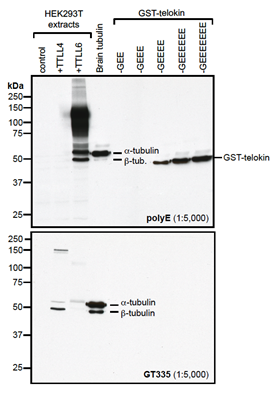
Western blot analysis of protein polyglutamylation by anti-Polyglutamate chain (polyE), pAb (IN105) (Prod. No. AG-25B-0030).Method: HEK-293T cells are grown in standard culture conditions, transfected with plasmids expressing the tubulin glut
anti-Polyglutamate chain [Poly-E], pAb (IN105)

AG-25B-0030
ApplicationsWestern Blot, ImmunoCytoChemistry, ImmunoHistoChemistry
Product group Antibodies
ReactivityAll Species
Overview
- SupplierAdipoGen Life Sciences
- Product Nameanti-Polyglutamate chain (polyE), pAb (IN105)
- Delivery Days Customer10
- Antibody SpecificityRecognizes C-terminally located linear alpha-glutamate chains of 4 and more glutamate residues.
- ApplicationsWestern Blot, ImmunoCytoChemistry, ImmunoHistoChemistry
- CertificationResearch Use Only
- ClonalityPolyclonal
- FormulationLiquid
- HostRabbit
- Scientific DescriptionMicrotubules are key elements of the eukaryotic cytoskeleton that dynamically assemble from heterodimers of alpha- and beta-tubulin. Two different mechanisms can generate microtubule diversity: the expression of different alpha- and beta-tubulin genes, referred to as tubulin isotypes, and the generation of posttranslational modifications (PTMs) on alpha- and beta-tubulin. Tubulin PTMs include the well-known acetylation or phosphorylation, and others that have so far mostly been found on tubulin, detyrosination/tyrosination, polyglutamylation and polyglycylation. These PTMs might have evolved to specifically regulate tubulin and microtubule functions. Polyglutamylation is a PTM that occurs when secondary glutamate side chains are formed on gamma-carboxyl groups of glutamate residues in a protein. Enzymes catalyzing polyglutamylation belong to the TTL-like (TTLL; Tubulin tyrosine ligase-like) family of glutamylases. Deglutamylases, the enzymes that reverse polyglutamylation, were identified within a novel family of CCPs (cytosolic carboxypeptidase). Subtle differences in polyglutamylation can be seen on diverse microtubules in different cell types. The functions of these modifications remain to be studied. However, its wide distribution strengthens the idea that it could be involved in fine-tuning a range of microtubule functions. PolyE labels centrioles as they mature, such that two foci are present throughout the cell cycle. - Polyclonal Antibody. Recognizes C-terminally located linear glutamate chains of 4 and more glutamate residues. Source: Rabbit. Applications: ICC, IHC, WB. Liquid. In PBS containing 0.02% sodium azide. Microtubules are key elements of the eukaryotic cytoskeleton that dynamically assemble from heterodimers of alpha- and beta-tubulin. Two different mechanisms can generate microtubule diversity: the expression of different alpha- and beta-tubulin genes, referred to as tubulin isotypes, and the generation of posttranslational modifications (PTMs) on alpha- and beta-tubulin. Tubulin PTMs include the well-known acetylation or phosphorylation, and others that have so far mostly been found on tubulin, detyrosination/tyrosination, polyglutamylation and polyglycylation. These PTMs might have evolved to specifically regulate tubulin and microtubule functions. Polyglutamylation is a PTM that occurs when secondary glutamate side chains are formed on gamma-carboxyl groups of glutamate residues in a protein. Enzymes catalyzing polyglutamylation belong to the TTL-like (TTLL; Tubulin tyrosine ligase-like) family of glutamylases. Deglutamylases, the enzymes that reverse polyglutamylation, were identified within a novel family of CCPs (cytosolic carboxypeptidase). Subtle differences in polyglutamylation can be seen on diverse microtubules in different cell types. The functions of these modifications remain to be studied. However, its wide distribution strengthens the idea that it could be involved in fine-tuning a range of microtubule functions.
- ReactivityAll Species
- Storage Instruction-20°C,2°C to 8°C
- UNSPSC12352203
